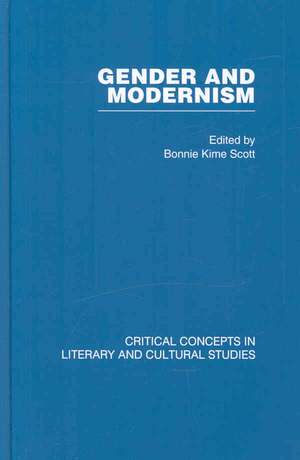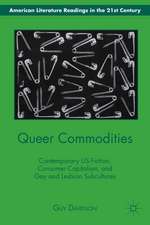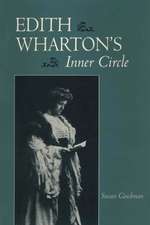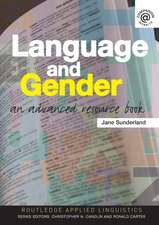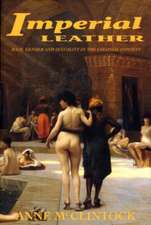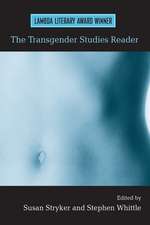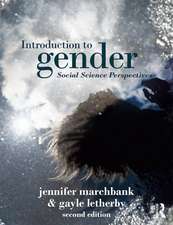Gender and Modernism: Critical Concepts 4 vols: Critical Concepts in Literary and Cultural Studies: Critical Concepts in Literary and Cultural Studies
Editat de Bonnie Kime Scotten Limba Engleză Hardback – 19 mar 2008
The discussion of gender in modernism arose in the 1970s, along with the second wave of feminism and the introduction of feminist theory and criticism to the academy. It challenged the ways that the modernist canon, and the experimental forms associated with modernism, had been fashioned as normatively male. Early on, various approaches to the exploration of gender were available, including the gendering of style available in French Feminist theory, psychoanalytic approaches, materialist feminism, and gyno-critical attention to women writers. Raising questions of gender concerning modernist texts had become an expectation by the 1990s. Debates about the adequacy of gender as the central concern of feminist theory have led to the useful concept of intersectionality, which heeds the ways that other social categories, such as race, class, sexuality, dis/ability, and global/colonial location, intersect with gender in creating the standpoint of an individual. Equally valuable are challenges to binary divisions encouraged by gendered oppositions, and the study of ways that gender is produced by culture or performed.
Preț: 4231.59 lei
Preț vechi: 6606.33 lei
-36% Nou
Puncte Express: 6347
Preț estimativ în valută:
809.97€ • 880.10$ • 680.82£
809.97€ • 880.10$ • 680.82£
Carte tipărită la comandă
Livrare economică 22 aprilie-06 mai
Preluare comenzi: 021 569.72.76
Specificații
ISBN-13: 9780415380928
ISBN-10: 0415380928
Pagini: 1544
Dimensiuni: 156 x 234 x 127 mm
Greutate: 2.88 kg
Ediția:New.
Editura: Taylor & Francis
Colecția Routledge
Seria Critical Concepts in Literary and Cultural Studies
Locul publicării:Oxford, United Kingdom
ISBN-10: 0415380928
Pagini: 1544
Dimensiuni: 156 x 234 x 127 mm
Greutate: 2.88 kg
Ediția:New.
Editura: Taylor & Francis
Colecția Routledge
Seria Critical Concepts in Literary and Cultural Studies
Locul publicării:Oxford, United Kingdom
Public țintă
PostgraduateCuprins
Volume I: Modernists Write Gender. Issues of Formal Authority. Gender Politics. Racial Expressions and Transgressions. On the Colonial Horizon. Other Arts. Volume II: Critical Gender Studies of Modernism: The Makings of Modernism. Reading Gender into Modernist Canons. Issues of Sexual Textuality. Modernism, Gender and War. Productive and Contested Spaces. Volume III: Critical Gender Studies of Modernism: Diversity of Focus. Gender, Genre, and Discourse. Traversing High/Low Modernism and Other Arts. Decolonizing Modernism. Volume IV: Critical Gender Studies of Modernism: Diversity of Identities. Masculine and Feminine Performances. Intersections of Gender and Race. Lesbian, Gay, and Queer Intersections.
Notă biografică
Bonnie Kime Scott is Professor of Women's Studies at San Diego State University, where she teaches courses concerning women writers, feminist theory, gender, and representation. Her writing over the last decade has been devoted to the feminist re-vision of literary modernism and she is currently working on a sequel to The Gender of Modernism: A Critical Anthology, which originally came out in 1990.
Descriere
A broad collection spanning the last three decades of literary criticism alongside earlier key pieces written during the modernist period. Modernism, whether seen as a period designation, a manifestation of formal experimentation, or an aspect of modernity, has since its inception been marked, consciously or unconsciously, by gender.
